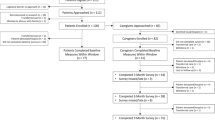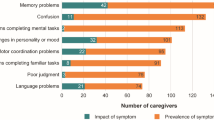Abstract
Purpose
Caregivers of patients living longer with high-grade malignant glioma (HGG) have the unique challenge of caring for a person who may have cognitive impairment, along with cancer-related issues over a prolonged period of time. This study aims to detail the psychosocial profile of long-term caregivers, to describe their perceptions of the patient’s quality of life and to examine predictors of their psychological distress.
Methods
Sixty-nine caregivers (48 %) of eligible patients with HGG surviving over 2 years were recruited from two Australian metropolitan tertiary hospitals. Caregivers completed cross-sectional measures of psychological distress (GHQ-12), caregiver impact (FACQ-PC) and patient functional well-being (FACT-Br TOI). Correlational analyses identified factors related to caregiver psychological distress. Those of significance (p ≤ .01) were examined using multiple regression models to determine their predictive value.
Results
Caregivers were mostly female (73 %), spouses (67 %), cohabiting (78 %) and were caring for patients surviving a median of 5.9 years since diagnosis. Whilst caregivers overall reported minimal psychological distress, 28 % endorsed moderate to severe psychological distress, warranting clinical attention. Caregiver strain and low patient functional well-being both significantly predicted caregiver psychological distress (adjusted R 2 = .35, F(4, 60) = 17.7, p < .001), accounting for a moderate amount (35 %) of variance. Other typical factors such as duration of caregiving, performance status, symptom burden and disease or demographic related factors were not predictive.
Conclusions
Psychological distress affects a significant proportion of caregivers of patients living longer with HGG. The presence of caregiver strain and low patient functional well-being are the most important predictors of psychological distress among this cohort of caregivers.

Similar content being viewed by others
References
Canstat: A digest of facts and figures on cancer. Cancers of the brain and central nervous system. (2010). In: Victoria CC (ed)
Dally M, Rosenthal M, Drummond K, Murphy M, Cher L, Ashley D, Thursfield V, Giles G (2009) Radiotherapy management of patients diagnosed with glioma in Victoria (1998-2000): a retrospective cohort study. J Med Imaging Radiat Oncol 53(3):318–324. doi:10.1111/j.1754-9485.2009.02072.x
Stupp R, Mason WP, van den Bent MJ, Weller M, Fisher B, Taphoorn MJ, Belanger K, Brandes AA, Marosi C, Bogdahn U, Curschmann J, Janzer RC, Ludwin SK, Gorlia T, Allgeier A, Lacombe D, Cairncross JG, Eisenhauer E, Mirimanoff RO (2005) Radiotherapy plus concomitant and adjuvant temozolomide for glioblastoma. N Engl J Med 352(10):987–996. doi:10.1056/NEJMoa043330
Wen PY, Kesari S (2008) Malignant gliomas in adults. N Engl J Med 359(5):492–507. doi:10.1056/NEJMra0708126
Hottinger AF, Yoon H, DeAngelis LM, Abrey LE (2009) Neurological outcome of long-term glioblastoma survivors. J Neuro-Oncol 95(3):301–305. doi:10.1007/s11060-009-9946-9
Flechl B, Ackerl M, Sax C, Dieckmann K, Crevenna R, Gaiger A, Widhalm G, Preusser M, Marosi C (2012) Neurocognitive and sociodemographic functioning of glioblastoma long-term survivors. J Neuro-Oncol 109(2):331–339. doi:10.1007/s11060-012-0897-1
Bahr O, Herrlinger U, Weller M, Steinbach JP (2009) Very late relapses in glioblastoma long-term survivors. J Neurol 256(10):1756–1758. doi:10.1007/s00415-009-5167-6
Keir ST, Farland MM, Lipp ES, Friedman HS (2008) Distress persists in long-term brain tumor survivors with glioblastoma multiforme. J Cancer Surviv 2(4):269–274. doi:10.1007/s11764-008-0069-7
Collins A, Lethborg C, Brand C, Gold M, Moore G, Sundararajan V, Murphy M, Philip J (2014) The challenges and suffering of caring for people with primary malignant glioma: qualitative perspectives on improving current supportive and palliative care practices. BMJ Support Palliat Care 4(1):68–76. doi:10.1136/bmjspcare-2012-000419
Australian Government (2011) National carer strategy. Commonwealth of Australia, Canberra
HM Government (2010) Recognised, valued and supported: next steps for the carers strategy. Department of Health, London
Russell B, Collins A, Dally M, Dowling A, Gold M, Murphy M, Philip J (2014) Living longer with adult high-grade glioma:setting a research agenda for patients and their caregivers. J Neurooncol. doi:10.1007/s11060-014-1516-0
Wasner M, Paal P, Borasio GD (2013) Psychosocial care for the caregivers of primary malignant brain tumor patients. J Soc Work End Life Palliat Care 9(1):74–95. doi:10.1080/15524256.2012.758605
Davies E, Hall S, Clarke C (2003) Two year survival after malignant cerebral glioma: patient and relative reports of handicap, psychiatric symptoms and rehabilitation. Disabil Rehabil 25(6):259–266
Lovely MP, Stewart-Amidei C, Page M, Mogensen K, Arzbaecher J, Lupica K, Maher ME (2013) A new reality: long-term survivorship with a malignant brain tumor. Oncol Nurs Forum 40(3):267–274. doi:10.1188/13.ONF.267-274
Smoll NR, Schaller K, Gautschi OP (2013) Long-term survival of patients with glioblastoma multiforme (GBM). J Clin Neurosci 20(5):670–675. doi:10.1016/j.jocn.2012.05.040
Australian Population and Migration Research Centre (2011) Accessibility/Remoteness Index of Australia Plus (ARIA+). University of Adelaide. http://www.adelaide.edu.au/apmrc/research/projects/category/aria.html. Accessed 18 Dec 2013
Goldberg D, Williams P (1988) A user's guide to the GHQ. NFER-Nelson, Windsor
Goldberg DP, Gater R, Sartorius N, Ustun TB, Piccinelli M, Gureje O, Rutter C (1997) The validity of two versions of the GHQ in the WHO study of mental illness in general health care. Psychol Med 27(1):191–197
Andrich D, van Schoubroeck L (1989) The general health questionnaire: a psychometric analysis using latent trait theory. Psychol Med 19(2):469–485
Cooper B, Kinsella GJ, Picton C (2006) Development and initial validation of a family appraisal of caregiving questionnaire for palliative care. Psycho-Oncology 15(7):613–622. doi:10.1002/pon.1001
Oken MM, Creech RH, Tormey DC, Horton J, Davis TE, McFadden ET, Carbone PP (1982) Toxicity and response criteria of the Eastern Cooperative Oncology Group. Am J Clin Oncol 5(6):649–655
Fries BE, Schneider DP, Foley WJ, Gavazzi M, Burke R, Cornelius E (1994) Refining a case-mix measure for nursing homes: Resource Utilization Groups (RUG-III). Med Care 32(7):668–685
Weitzner MA, Meyers CA, Gelke CK, Byrne KS, Cella DF, Levin VA (1995) The Functional Assessment of Cancer Therapy (FACT) scale. Development of a brain subscale and revalidation of the general version (FACT-G) in patients with primary brain tumors. Cancer 75(5):1151–1161
Cella DF, Tulsky DS, Gray G, Sarafian B, Linn E, Bonomi A, Silberman M, Yellen SB, Winicour P, Brannon J et al (1993) The Functional Assessment of Cancer Therapy scale: development and validation of the general measure. J Clin Oncol 11(3):570–579
Fox SW, Lyon D, Farace E (2007) Symptom clusters in patients with high-grade glioma. J Nurs Scholarsh 39(1):61–67
Tabachnick B, Fidell L (2007) Using multivariate statistics, 5th edn. Pearson Education Inc., Boston
Hudson P, Trauer T, Kelly B, O'Connor M, Thomas K, Summers M, Zordan R, White V (2013) Reducing the psychological distress of family caregivers of home-based palliative care patients: short-term effects from a randomised controlled trial. Psycho-Oncology 22(9):1987–1993. doi:10.1002/pon.3242
Janssen DJ, Spruit MA, Wouters EF, Schols JM (2012) Family caregiving in advanced chronic organ failure. J Am Med Dir Assoc 13(4):394–399. doi:10.1016/j.jamda.2011.04.017
Knott C (2013) Health survey for england 2012: General mental and physical health, vol 1. Department of Epidemiology and Public Health, University College London, London
Kvale EA, Murthy R, Taylor R, Lee JY, Nabors LB (2009) Distress and quality of life in primary high-grade brain tumor patients. Support Care Cancer 17(7):793–799. doi:10.1007/s00520-008-0551-9
Jones LW, Cohen RR, Mabe SK, West MJ, Desjardins A, Vredenburgh JJ, Friedman AH, Reardon DA, Waner E, Friedman HS (2009) Assessment of physical functioning in recurrent glioma: preliminary comparison of performance status to functional capacity testing. J Neurooncol 94(1):79–85. doi:10.1007/s11060-009-9803-x
Lamperti E, Pantaleo G, Finocchiaro CY, Silvani A, Botturi A, Gaviani P, Sarno L, Salmaggi A (2012) Recurrent brain tumour: the impact of illness on patient's life. Support Care Cancer 20(6):1327–1332. doi:10.1007/s00520-011-1220-y
Schmer C, Ward-Smith P, Latham S, Salacz M (2008) When a family member has a malignant brain tumor: the caregiver perspective. J Neurosci Nurs 40(2):78–84
Boele FW, Hoeben W, Hilverda K, Lenting J, Calis A-L, Sizoo EM, Collette EH, Heimans JJ, Taphoorn MJB, Reijneveld JC, Klein M (2013) Enhancing quality of life and mastery of informal caregivers of high-grade glioma patients: a randomized controlled trial. J Neuro-Oncol 111(3):303–311. doi:10.1007/s11060-012-1012-3
Sneeuw KC, Aaronson NK, Osoba D, Muller MJ, Hsu MA, Yung WK, Brada M, Newlands ES (1997) The use of significant others as proxy raters of the quality of life of patients with brain cancer. Med Care 35(5):490–506
Brown PD, Decker PA, Rummans TA, Clark MM, Frost MH, Ballman KV, Arusell RM, Buckner JC (2008) A prospective study of quality of life in adults with newly diagnosed high-grade gliomas: comparison of patient and caregiver ratings of quality of life. Am J Clin Oncol 31(2):163–168. doi:10.1097/COC.0b013e318149f1d3
Giesinger JM, Golser M, Erharter A, Kemmler G, Schauer-Maurer G, Stockhammer G, Muigg A, Hutterer M, Rumpold G, Holzner B (2009) Do neurooncological patients and their significant others agree on quality of life ratings? Health Qual Life Outcomes 7:87–87. doi:10.1186/1477-7525-7-87
Holzner B, Kemmler G, Cella D, De Paoli C, Meraner V, Kopp M, Greil R, Fleischhacker WW, Sperner-Unterweger B (2004) Normative data for functional assessment of cancer therapy–general scale and its use for the interpretation of quality of life scores in cancer survivors. Acta Oncol 43(2):153–160
Acknowledgments
Dr. Jeremy Ruben and Ms. Robin Smith (William Buckland Radiotherapy Oncology Service)
Conflict of interests
The authors have no competing interests.
Author information
Authors and Affiliations
Corresponding author
Rights and permissions
About this article
Cite this article
Russell, B., Collins, A., Dowling, A. et al. Predicting distress among people who care for patients living longer with high-grade malignant glioma. Support Care Cancer 24, 43–51 (2016). https://doi.org/10.1007/s00520-015-2739-0
Received:
Accepted:
Published:
Issue Date:
DOI: https://doi.org/10.1007/s00520-015-2739-0




